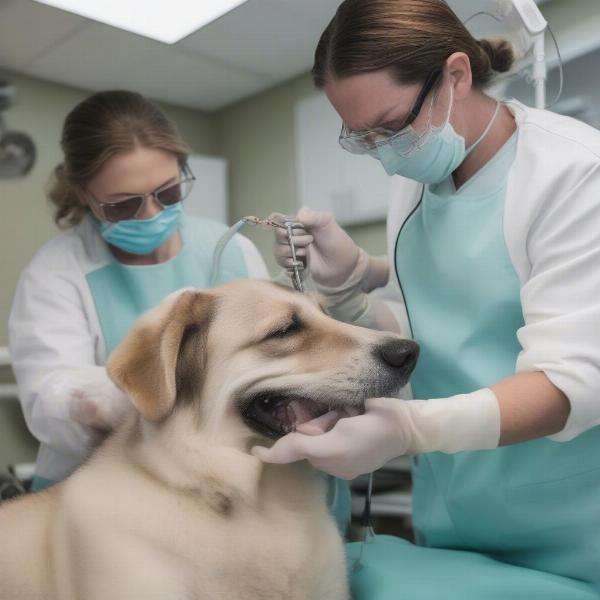Dental health is crucial for your dog’s overall well-being. Just like humans, dogs can experience a range of dental issues requiring professional attention. “Dog dental operation” encompasses various procedures, from routine cleanings to more complex extractions. Understanding these procedures, their importance, and what to expect can help you make informed decisions for your furry companion’s health. This guide will cover everything you need to know about dog dental operations.
Understanding the Need for Dog Dental Operations
Many dog owners underestimate the importance of dental care. Untreated dental issues can lead to painful infections, difficulty eating, and even more serious health problems affecting the heart, kidneys, and liver. Regular dental checkups and operations are essential preventative measures.
Common Dog Dental Operations
Several types of dental operations are common for dogs. These include:
- Dental Cleaning: This routine procedure involves scaling and polishing the teeth to remove plaque and tartar buildup. It’s often performed under general anesthesia to ensure thorough cleaning and minimize stress for the dog.
- Tooth Extractions: Damaged, infected, or loose teeth may need to be extracted. This procedure often requires general anesthesia and may involve stitches.
- Root Canals: In cases of severe infection or damage to the pulp of a tooth, a root canal may be necessary to save the tooth.
- Gum Surgery: This can address issues like gum disease (gingivitis and periodontitis), gum recession, and growths.
 Dog undergoing dental cleaning
Dog undergoing dental cleaning
Preparing Your Dog for a Dental Operation
Before any dental operation, your vet will conduct a thorough examination and may recommend blood tests to assess your dog’s overall health. You’ll be advised to fast your dog for a certain period before the procedure, usually from the night before.
Post-Operative Care
After a dental operation, your dog may experience some discomfort and require pain medication. Your vet will provide specific instructions for post-operative care, including diet recommendations (soft food), oral hygiene routines, and activity restrictions.
Choosing the Right Veterinary Dentist
Choosing a qualified veterinary dentist is crucial for ensuring a safe and successful operation. Look for a veterinarian with experience in dental procedures and a commitment to continuing education in veterinary dentistry.
Cost of Dog Dental Operations
The cost of dog dental operations varies depending on the complexity of the procedure, your location, and the veterinary clinic. It’s always best to obtain a detailed estimate from your vet before proceeding.
Maintaining Your Dog’s Dental Health at Home
Regular brushing, dental chews, and a balanced diet can significantly improve your dog’s oral health and reduce the need for frequent dental operations.
Dr. Emily Carter, DVM, a leading veterinary dentist at the Animal Dental Clinic, emphasizes, “Preventative care is key to maintaining your dog’s oral health. Regular brushing and dental treats can significantly minimize the risk of serious dental problems.”
Dr. Michael Davis, another renowned veterinary dental specialist, adds: “Don’t underestimate the importance of regular dental checkups. Early detection and treatment of dental issues can save you money and prevent significant discomfort for your dog.”
Conclusion
Dog dental operations are essential for maintaining your canine companion’s overall health and well-being. By understanding the various procedures, preparing your dog appropriately, and prioritizing preventative care, you can help your furry friend enjoy a healthy, happy smile for years to come. Don’t hesitate to contact your vet if you have any concerns about your dog’s dental health.
FAQ
- How often should my dog have a dental cleaning? Most dogs benefit from annual professional dental cleanings, but your vet may recommend more frequent cleanings depending on your dog’s individual needs.
- What are the signs of dental problems in dogs? Bad breath, excessive drooling, difficulty chewing, pawing at the mouth, and red or swollen gums are common indicators of dental issues.
- Is anesthesia safe for my dog during dental procedures? While anesthesia carries some risks, modern anesthetic protocols and monitoring equipment have made dental procedures much safer for dogs. Your vet will assess your dog’s health and tailor the anesthesia accordingly.
- How can I brush my dog’s teeth? Use a toothbrush and toothpaste specifically designed for dogs. Start slowly and gradually increase the frequency and duration of brushing sessions.
- What are good dental chews for dogs? Look for dental chews that are approved by the Veterinary Oral Health Council (VOHC) and appropriate for your dog’s size and breed.
- Can dental problems in dogs affect their overall health? Yes, untreated dental infections can spread to other parts of the body, including the heart, kidneys, and liver.
- How much does a dog dental operation typically cost? The cost varies depending on the procedure and location but can range from a few hundred dollars for a cleaning to several thousand dollars for more complex procedures like extractions or root canals.
Related Articles
dogs for sale in victoria
seizure dogs for epilepsy for sale
About ILM Dog
ILM Dog (https://ilmdog.com) is your comprehensive resource for all things dog-related. We offer expert advice on dog breeds, health, training, nutrition, grooming, and much more. From choosing the right breed to providing the best possible care, we’re here to help you every step of the way. Whether you’re a seasoned dog owner or just starting your journey, ILM Dog provides the reliable and practical information you need. Contact us today for personalized guidance! Email: [email protected] Phone: +44 20-3965-8624.